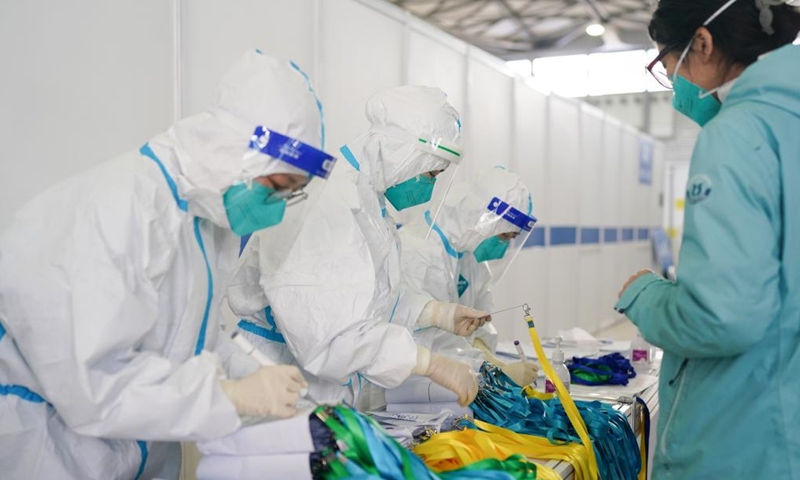
Medical workers work in the quarantine zone at the Shanghai New International Expo Center in east China's Shanghai, April 1, 2022.Photo:Xinhua
Sticking with the dynamic zero-case strategy is the best choice at the current stage, Chinese officials said on Tuesday, as data showed that the Chinese mainland's domestic COVID-19 infections had reached 325,303 since March 1, affecting 30 provincial-level regions, with Shanghai the severest.
Shanghai on Monday registered the highest daily infections in the mainland with 994 locally transmitted COVID-19 cases and 22,348 asymptomatic carriers reported. But it was the first time that the number of daily new asymptomatic infections
had decreased this month.
The new daily tally in Shanghai has remained above 10,000 for eight consecutive days, and the outbreak is still rapidly developing with community transmission still surging, Mi Feng, the spokesperson of the National Health Commission, said at a press conference on Tuesday.
Mi predicted that daily new infections in Shanghai would remain at a high level in the coming days.
After strict measures, emerging outbreaks in the country have been curbed effectively. The outbreaks, such as those in North China's Hebei and East China's Jiangsu, Zhejiang and Shandong provinces, are basically controlled.
The one in Northeast China's Jilin Province is showing a downtrend with new infections reduced to 1,000 in the past three days, Mi noted.
He stressed that China should unwaveringly stick with the dynamic zero-case strategy as the nationwide situation is still serious.
Sticking with the strategy is the best choice at the current stage, Wu Zunyou, chief epidemiologist of the Chinese Center for Disease Control and Prevention, said at the same press conference.
Wu made the remarks when asked whether, as a third option between dynamic-zero and "lying flat," China can allow the existence of the virus at a low level.
Wu noted that since the Wuhan outbreak in 2020, China stamped out every domestic outbreak using epidemic control measures mainly characterized by physical isolation. The strategy, summed up as the "dynamic zero-COVID strategy," has proven successful.
The main purpose of this strategy is to guarantee the health and lives of the public to the greatest extent.
Since the implementation of the strategy requires the coordination of departments and work with the all-round efforts of the entire nation and support from the public, it is an impossible route for many other countries, not to say physical isolation.
"Lying flat" is more of a helpless choice that other countries have to follow as they cannot find an ideal strategy to control the virus, so they simply "lie flat," Wu said.
Wu Qianyu, an official from the Shanghai health authority, emphasized at Tuesday's press briefing that Shanghai has strictly implemented lockdown management and will continue to carry out screening.
"If all the positive cases were detected and put under centralized treatment or quarantine following the citywide nucleic acid testing, it means the infection sources will be controlled and the 'inflexion point' of the epidemic will come," Lu Hongzhou, head of Shenzhen's anti-epidemic expert team and head of the Third People's Hospital of Shenzhen, told the Global Times on Tuesday.
Shanghai has been making efforts to build more makeshift hospitals and improve the delivery capacity to ensure residents get daily commodities promptly, a move to ease residents' concerns over the epidemic.
A total of 39 children with COVID-19 and their parents were discharged from a makeshift hospital at the Shanghai New International Expo Center on Tuesday morning following about one week of treatment or quarantine.
Yin Yong, head of the medical team of the Shanghai Children's Medical Center, told the Global Times that each child receives an evaluation before being discharged.
The discharge criteria include two consecutive negative nucleic acid tests with an interval of at least 24 hours and normal temperatures for three consecutive days, according to Yin.
"I have confidence in the Chinese government as the country has allocated resources nationwide to aid Shanghai, which demonstrates the advantages of the socialist system," Lu said.
China should insist on the dynamic-zero approach as it's the most effective way to combat the virus, according to Lu.




